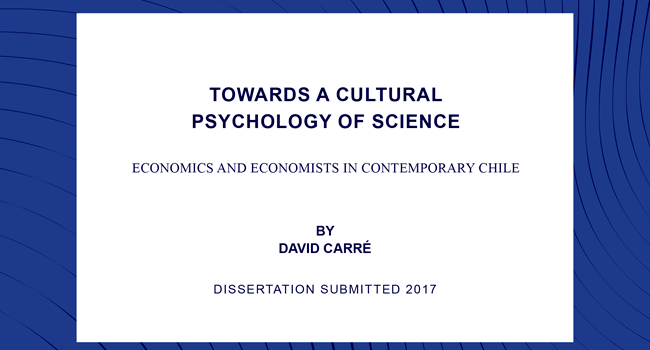Along history, the advances of science and technology have had a direct impact in how we organize our lives. How much we live, how we work, how we move around, how we communicate to each other, it is all largely influenced by the current status of scientific knowledge and its technological applications. In spite of playing such an important role, until the second half of the 20th century we understood very little about the making of scientific knowledge beyond the epistemological debate around it, i.e. the philosophy of science. Since the 1960s, the science and technology studies (STS) have inquired the nature and practices of science as a socially-determined phenomenon, thus making sociology, anthropology, and history the main disciplines for the field. On the other hand, despite frustrated efforts, psychology has so far not taken part in the social studies of science, leaving the personal understanding of the scientist as a largely neglected element. This status should not be surprising given the cognitive and individualistic focus that existing studies on psychology of science have had, something that makes difficult any dialogue with more socially oriented disciplines. The present thesis proposes to bridge this gap through a cultural psychology of science, which addresses scientific activity based in two tenets: (a) the meaning-making of personal, psychological experiences is something inherently connected, but not limited, to culturally-available meanings; (b) scientists create scientific knowledge by articulating culturally available theories, methodologies, and data not in a neutral way, but rather driven by a personal sense of purpose for creating the best possible knowledge according to their own experiences and commitments. Therefore, this approach makes possible to understand the personal dimension (e.g., interests, motivations, commitments) involved in the making of science without disconnecting it from collective elements, like scientific communities, institutions, and socio- historical backgrounds. At the same it reflects the purposeful character of scientific activity for those who actually produce that knowledge.
In the present thesis, this proposed cultural psychological approach is used to explore a very concrete case: the rise of economics and economists in contemporary Chile. Following a particular socio-political scenario in the 1970’s, economists– initially linked to the Chicago school of economics–turned into key social actors, holding an influence that spanned way beyond strictly economic issues. Thus, as bearers of economics knowledge, economists have been the authoritative source to settle debates on educational policy, healthcare, labor relations, among many other areas. Existing literature on this phenomenon, mostly historical and sociological, have focused in documenting the extent of this influence and also in calling into question the socio-political conditions that have made possible this rise of the economists in Chile. By doing so, little attention has been paid to the persons behind the seemingly unitary term ‘economist’. In order to address this shortcoming, the present thesis provides an updated, grounded account of the diversity of views and experiences collapsed under this label, based on a thematic analysis of in-depth interviews with current graduates, research assistants, doctoral students, and professors on economics in Chile.
While most of the economists interviewed shared the diagnosis made by social science scholars on the massive influence of the discipline, their perspectives on this topic varied greatly—from criticism to support—, and were based on very different rationales—from political to epistemological. Moreover, the analysis of economists' personal experiences and perspectives provided novel insight into a range of topics related to the creation, circulation and use of economics knowledge in Chile that have been mostly neglected. It was thus possible to observe how concrete biographical experiences, personal motivations, and views on the discipline (regarding its methodology, limitations, and normative orientations) all were interwoven at the moment of defining participants' position as economists within the Chilean economics community. Therefore, it seems no longer reasonable to assume that every economist in Chile plainly submits to the social norms and procedures that organize this scientific community. On the contrary, there was a consistent involvement of the participants, which drove their personal work as economists and that could not be reduced—yet not disconnected either—to socio-cultural elements.
In sum, the present thesis looks to complement existing social studies of science with a cultural psychological perspective, which is sensitive to the personal nature of the scientific activity but also to the cultural conditions in which scientific knowledge is constructed, without subsuming any of these dimensions into the other. At the same time, it offers a novel perspective on the notorious role that economists have had in contemporary Chilean society, a topic that has been largely addressed as social and institutional.

